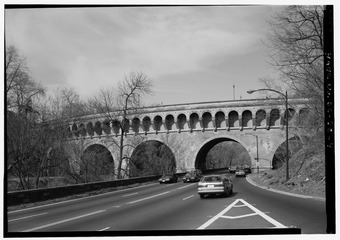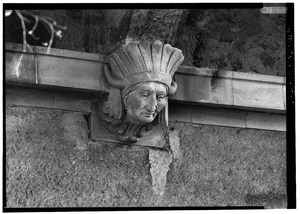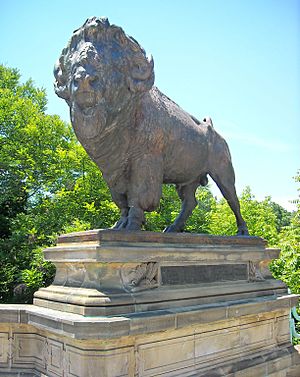Dumbarton Bridge (Washington, D.C.) facts for kids
The Dumbarton Bridge, also known as the Q Street Bridge and the Buffalo Bridge, is a special old bridge in Washington, D.C.. It's made of stone and has arches. This bridge helps Q Street Northwest cross over Rock Creek Park. It connects the Dupont Circle and Georgetown neighborhoods. The bridge was built between 1914 and 1915.
|
Dumbarton Bridge
|
|
 |
|
| Location | Q Street, Northwest over Rock Creek Park Washington, D.C. |
|---|---|
| Built | 1915 |
| Architect | Glenn Brown Alexander Proctor |
| Architectural style | Romanesque Revival |
| NRHP reference No. | 73002080 |
Quick facts for kids Significant dates |
|
| Added to NRHP | July 16, 1973 |
Contents
History of the Dumbarton Bridge
Why the Bridge Was Built
Around 1905, people living in Georgetown wanted less traffic on M Street. They needed a new way to get to Washington, D.C. One big idea was to move Rock Creek's water into a tunnel. Then, they would fill in the old creek bed. This would let them extend Georgetown's streets. Many people didn't like Rock Creek because it was often dirty.
This idea was very expensive. It would cost about $4.5 million. Building a new bridge was much cheaper. Estimates for a bridge were between $150,000 and $200,000. Another idea was to move an existing bridge, the Woodley Lane Bridge. But engineers found this would also be too costly.
In December 1910, a plan to fund the bridge went to Congress. Congress approved it two months later. They set aside $275,000 to build the bridge. Another $75,000 was for buying land. This land was needed to extend Q Street to the new bridge.
Building the Dumbarton Bridge
The bridge's design was created by Glenn Brown. The engineering plans were done by Daniel B. Luten. The bridge shows the influence of the "City Beautiful" movement. This movement aimed to make cities more beautiful and grand. Architects, engineers, and sculptors worked together on this project.
The designers looked at pictures of bridges worldwide. They were inspired by old Roman aqueducts and mountain bridges in Italy. They wanted the bridge's stone color to remind people of warm places like Spain and Italy. The bridge also features special decorations. There are Indian head designs based on a life mask of the Sioux Chief Kicking Bear.
The bridge has a curved shape. This was needed because Q Street in Dupont Circle is a bit north of Q Street in Georgetown. To make the street continuous, a house called Dumbarton House had to be moved. It was shifted about 100 feet north from its original spot.
In June 1913, the city asked for bids to build the bridge. But all the bids were too high. So, the plans were changed. They decided to build five arches instead of seven to save money. A.L. Guidone won the construction bid.
The bridge features four large buffalo sculptures. These were made by Alexander Phimister Proctor. He also designed the lions on the Sixteenth Street Bridge. Each buffalo was cast in a single piece of bronze.
Construction of the bridge started on March 14, 1914. The main bridge was finished by October 1915. It took two more months to prepare the roads leading to it.
Opening and Naming
The Dumbarton Bridge officially opened on December 24, 1915, at 4 p.m. At first, it was known as the Q Street Bridge. The bridge was lit up by incandescent lamps.
On June 5, 1916, the District of Columbia Commissioners officially named it the Dumbarton Bridge. They said the name honored the land where Georgetown's eastern part was built. This land was given to Ninian Beall by the British crown.
The Dumbarton Bridge was added to the National Register of Historic Places on July 16, 1973. This means it's recognized as an important historical site.



